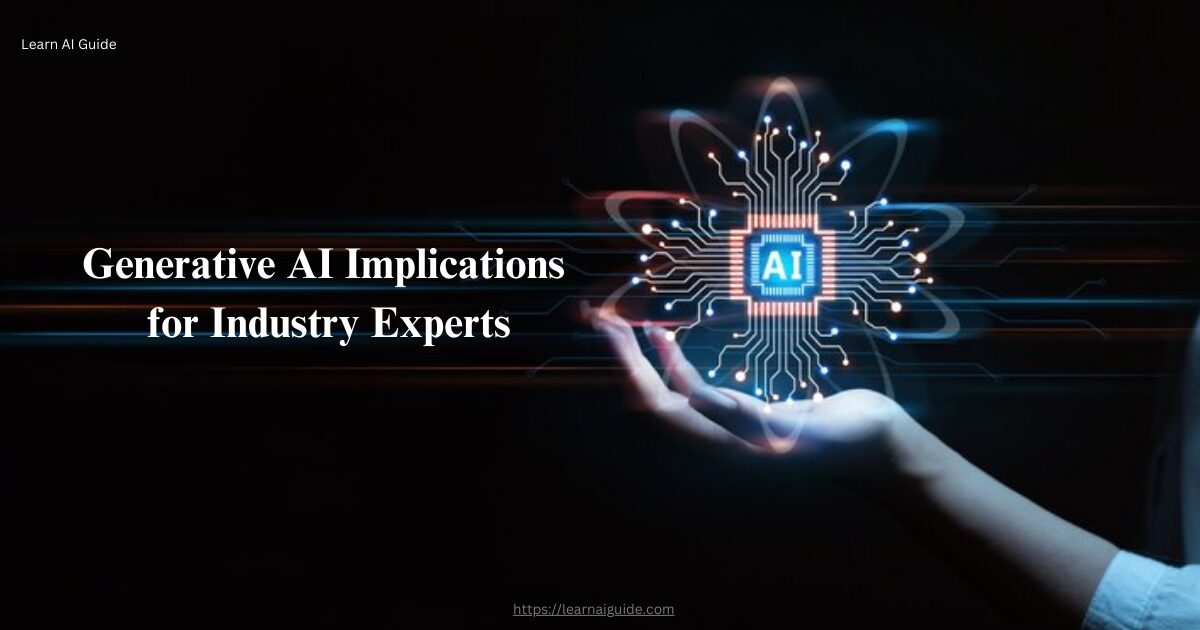Introduction
Generative AI (Artificial Intelligence) has emerged as a revolutionary force in the technology landscape. As industries continue to evolve, the implications of generative AI are profound and far-reaching. Generative AI Implications for Industry Experts
Industry experts must understand and navigate this rapidly advancing field. This article delves into the mechanisms of generative AI.
Its transformative applications across various sectors, the challenges and ethical considerations it brings, and the future prospects for sustainable innovation.
Deep Dive into Generative AI Mechanisms
Generative AI, at its core, involves creating new data from existing datasets. Unlike traditional AI models that classify or predict based on input data, generative AI produces novel outputs.
These outputs can range from text and images to music and more. The underlying mechanisms of generative AI involve complex algorithms and neural networks, particularly Generative Adversarial Networks (GANs) and Variational Autoencoders (VAEs).
GANs consist of two neural networks, the generator and the discriminator, that work in tandem. The generator creates data, while the discriminator evaluates its authenticity.
Through this adversarial process, GANs refine their outputs to produce realistic results. On the other hand, VAEs encode input data into a latent space, then decode it to generate new data, ensuring diversity and creativity in the outputs.
Understanding these mechanisms is crucial for industry experts. It enables them to harness the power of generative AI effectively.
By mastering the intricacies of GANs and VAEs, professionals can develop innovative solutions and drive advancements in their respective fields.
Transformative Applications Across Industries
Generative AI has already begun to transform various industries, bringing about significant advancements and efficiencies.
In healthcare, for instance, generative AI is revolutionizing drug discovery and medical imaging. AI models can analyze vast datasets to identify potential drug candidates, accelerating the development process.
Additionally, generative AI enhances medical imaging techniques, aiding in the early detection and diagnosis of diseases.
The finance industry is also experiencing a paradigm shift with generative AI. Financial institutions utilize AI models for fraud detection and risk management.
By analyzing transaction patterns and detecting anomalies, generative AI helps prevent fraudulent activities. Furthermore, in algorithmic trading, AI-driven models predict market trends, enabling more informed investment decisions.
Creative industries, including media and entertainment, are benefiting immensely from generative AI. Content creation, such as text generation, image synthesis, and music composition, is becoming more efficient and personalized.
AI-driven tools assist writers, artists, and musicians in producing high-quality content, enhancing creativity and productivity.
Manufacturing is another sector witnessing significant improvements through generative AI. Predictive maintenance powered by AI models helps identify potential equipment failures before they occur, reducing downtime and operational costs.
Additionally, generative design algorithms optimize product designs, leading to innovative and efficient manufacturing processes.
Navigating the Challenges and Ethical Landscape
Despite its transformative potential, generative AI poses several challenges and ethical considerations. One of the primary challenges is keeping up with the rapid pace of advancements.
Industry experts must continuously update their knowledge and skills to stay relevant. Engaging in continuous learning through courses, webinars, and industry networks is essential.
Integration and scalability are also significant challenges. Implementing generative AI into existing systems requires careful planning and execution.
Successful integration often involves overcoming technical hurdles and ensuring compatibility with legacy systems. Case studies of successful AI implementations can provide valuable insights and best practices.
Ethical concerns surrounding generative AI are paramount. Addressing bias and fairness in AI models is critical to avoid perpetuating societal inequalities.
Ensuring data privacy and security is another pressing issue. Industry experts must adopt robust data management practices to protect sensitive information.
Moreover, navigating the evolving regulatory landscape is crucial. Governments and regulatory bodies are increasingly focusing on AI regulations.
Industry experts must stay informed about current and emerging regulations to ensure compliance. Developing and implementing ethical guidelines for AI use can promote transparency and accountability.
The Future of Generative AI: Ethical Frameworks and Sustainable Innovation
The future of generative AI holds immense promise for sustainable innovation. Emerging technologies, such as quantum computing, are expected to further enhance AI capabilities.
Quantum computing can potentially solve complex problems more efficiently, opening new avenues for AI applications.
Edge computing is another emerging trend, enabling real-time AI processing at the edge of networks, reducing latency, and enhancing performance.
Industry-specific trends are also shaping the future of generative AI. In healthcare, personalized medicine driven by AI is expected to become more prevalent.
Tailoring treatments to individual patients based on their genetic makeup and medical history can significantly improve healthcare outcomes.
In finance, AI-driven financial advisory services are likely to gain traction, providing personalized investment strategies to clients.
Global trends indicate an increasing emphasis on collaboration and competition in the AI space. Nations and organizations are investing heavily in AI research and development, striving to achieve a competitive edge.
International collaborations can accelerate advancements and promote the responsible use of AI technologies. Ethical frameworks will play a pivotal role in shaping the future of generative AI.
Developing and adhering to ethical guidelines ensures that AI technologies are used responsibly and for the greater good.
Transparency, accountability, and fairness must be at the forefront of AI development and deployment. Industry experts have a crucial role in advocating for and implementing these ethical principles.
Conclusion
Generative AI is a transformative force with profound implications for industry experts. Understanding the mechanisms of generative AI, exploring its applications across various industries, and navigating the challenges and ethical considerations are essential steps for leveraging its potential.
As the future unfolds, embracing emerging technologies, staying informed about industry trends, and adhering to ethical frameworks will drive sustainable innovation and ensure the responsible use of generative AI.
Generative AI Implications for Industry Experts that’s al for today, For More: https://learnaiguide.com/20-ai-certifications-to-know/
